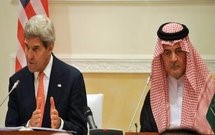 Whether or not Saudi Arabia is capable of deploying a nuclear arsenal with Pakistan's help, there are political and diplomatic factors preventing the countries from conducting such a transaction.
Whether or not Saudi Arabia is capable of deploying a nuclear arsenal with Pakistan's help, there are political and diplomatic factors preventing the countries from conducting such a transaction.
Rumors of Saudi Arabia purchasing its own nuclear program have spread after a Nov. 6 BBC report claimed that the Saudis could seek to acquire nuclear weapons from Pakistan before Iran could field its own nuclear arsenal. However, such reports are not new.
Saudi-Pakistani relations are strong, and the Saudis have long invested in Pakistan's military capability, so it is not inconceivable in theory that Islamabad would provide Riyadh with nuclear weapons. But after the blowback when it was revealed in 2004 that Abdul Qadeer Khan, a top Pakistani nuclear scientist, was sharing sensitive nuclear technology, Pakistan has no desire to take part in nuclear proliferation.
Nor does Islamabad wish to invite Tehran to retaliate in neighboring Afghanistan, which is already fragile and unstable. The truth behind this report is that Saudi Arabia is floating the potential extreme consequences if the United States does not take a hard line with Iran during nuclear negotiations.
Saudi Arabia and Pakistan have an enduring and close relationship. Bilateral relations on an economic, intelligence and military level are extensive. In fact, Saudi Arabia has provided Pakistan with more aid than any other country outside the Arab world since the 1960s. Pakistani troops have repeatedly served in Saudi Arabia, and the kingdom was one of only a select few countries to back Pakistan after its nuclear tests in 1998.
The countries have long denied the existence of any deal for the transfer of nuclear weapons to Saudi Arabia in case of necessity. However, their close relationship and the fact that Saudi Arabia has directly invested in Pakistan's nuclear and missile programs means the possibility cannot be discarded.
The Options
There is circumstantial evidence that the Saudis are preparing in the event that they need a nuclear arsenal. Since the 1980s, the Saudis have fielded a number of CSS-2 missiles purchased from China. The CSS-2's inaccuracy limits its utility in a conventional role, but accuracy is somewhat less of a concern when using nuclear warheads. IHS Jane's analyzed some Saudi launch bases this year and found that the missiles at the bases are deployed such that they are aligned with targets in Israel and Iran.
Pakistan has immense experience with medium-range ballistic missiles. Islamabad has been mating various nuclear warheads with different missiles for more than a decade and would likely have the expertise to do the same with the CSS-2, a system that is deployed and operational throughout the world. Considering that the CSS-2 was built for a nuclear role and that Pakistan reportedly possesses warhead blueprints for the CSS-2 from China, it would be a relatively straightforward process for Pakistan to equip the Saudi CSS-2 missiles with a nuclear warhead.
In another scenario, Pakistan could provide not only the nuclear warhead but also the entire delivery system to Saudi Arabia. As illustrated by its successful test Oct. 5 of the Hatf IX missile, Pakistan continues to make considerable progress in fielding various nuclear delivery systems even though its overall military capability continues to suffer from industrial and fiscal issues. Islamabad could equip Riyadh with nuclear-tipped medium-range ballistic missiles, cruise missiles or even gravity bombs for their fighter bombers.
Saudi Arabia's Logic
Saudi Arabia could theoretically leverage its vast financial resources to buy a nuclear capability from Pakistan, but there are a number of issues. First, no system can be considered operational without considerable testing, but testing of a ballistic missile would be easily detectable. Moreover, expertise is required to maintain the systems once in place, so substantial assistance from Pakistani experts would be needed -- something that would be difficult to do quietly. In other words, Saudi Arabia would have to rely almost completely on Pakistani support to get a system running quickly.
There are also political and diplomatic constraints to consider. International opposition would be vehement against both Saudi Arabia and Pakistan, whose nuclear program has already come under scrutiny. Although the United States is reducing its commitment in Afghanistan, and thus is putting less emphasis on Pakistan, Washington maintains significant oversight of the Pakistani nuclear program and would be in a position to threaten the Pakistanis' nuclear arsenal if Islamabad were to attempt such large-scale proliferation. The already troubled U.S.-Pakistani relationship would almost certainly deteriorate further.
Proclaiming itself a responsible nuclear state, Pakistan has already denied the BBC report as "baseless." As it stands, Iran does not have a nuclear weapon, and it is highly unlikely that Saudi Arabia and Pakistan would engage in such a transaction at this time with all the associated consequences.
However, it is important to remember that Saudi Arabia is deeply concerned about the direction of U.S.-Iranian negotiations, which the Saudis see as a dangerous development in U.S. policy in the Middle East. Concerned over a possible rapprochement between Washington and Tehran, the Saudis will continue to voice their strong opposition and concerns.
Reports that Saudi Arabia could acquire nuclear weapons from Pakistan, even if they are not enough to derail U.S.-Iranian negotiations, can at least accentuate the pressure on the United States to ensure that Washington negotiates hard, verifiable limits on the Iranian nuclear program. The Saudis have an interest in spreading the perception that a deal with Iran could result in a much bigger nuclear proliferation problem in the Middle East.
Courtesy : Stratfor (www.stratfor.com)